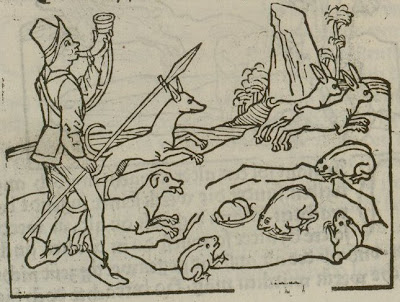HODIE: pridie Kalendas Apriles. You can add a Roman calendar as a widget in your blog or webpage, or display it as a Google Calendar: here's how.
MORE FABLES: Here are today's fables from the Ictibus Felicibus project. These fables ALL have long marks, plus stress marks for easy reading, and the poems have meter marks, too, along with an easy-to-read prose presentation of the story:
- Canis et Olitor, a great little story about a very ungrateful dog.
- Carbonarius et Fullo, the story of two incompatible professionals.
- Servus Piger et Herus, a funny little joke about a ne'er-do-well slave and his irate master.
- Aves et Rex Earum, Odo's story about the birds trying to choose the right kind of king.
- Ovis, Capra, Iuvenca et Leo, the famous story of the lion's share.
Vir quīdam verberibus castīgābat servum maximē ob pīgritiam. Hic clāmāre coepit: Cūr mē verberās? Nihil enim fēcī. At propter id ipsum, rēspondit herus, tē verberō, quod nihil fēcistī.TODAY'S MOTTOES & PROVERBS: You can get access to ALL the "proverb of the day scripts" (also available as random proverb scripts) at the SchoolhouseWidgets.com website.
Tiny Proverbs: Today's tiny proverb is: Naviga Anticyras (English: Take a trip to Anticyra - a saying that makes sense when you know that in antiquity the city of Anticyra was famous for hellebore, a drug that was used as a supposed cure for insanity).
3-Word Mottoes Verb-less: Today's 3-word verb-less motto is Verus ad finem (English: True until the end - although as a woman, I'd have to say vera ad finem).
Latin Animal Proverb: Today's animal proverb is Asinus in aula fovetur solum propter saccos portandos (English: A donkey is fostered in the castle only so that it can carry sacks - so, all of us donkeys working at the university need to remember just why they keep us around, ha ha).
Proverbs of Polydorus: Today's proverb from Polydorus is: Multi sunt vocati, pauci vero electi (English: Many are called, but few are chosen).
Proper Name Proverb from Erasmus: Today's proper name proverb from Erasmus is Cyclobori vox (English: The sound of the Cycloborus; from Adagia 3.2.16 - The Cycloborus was a river in Greece, proverbial for its roaring and crashing water course; to make a sound like the Cycloborus was to make a very large noise indeed!).
Greek Proverb of the Day: Today's proverb is Ἄχειρ νιφθῆναι βοῦλεται. (English: Manus non habens, lavari cupit - and there's the amazing Greek vocabulary at work: ἄχειρ, "un-handed" - they even have a word for being footless, ἄπους).
For an image today, here is an illustration to the story of the lion's share, Ovis, Capra, Iuvenca et Leo:
































